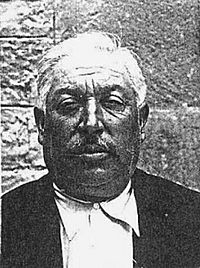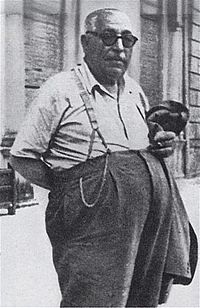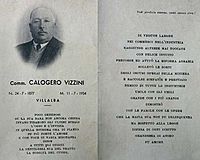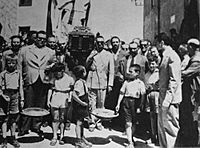Calogero Vizzini facts for kids
Quick facts for kids Calogero Vizzini |
|
|---|---|

1935 mugshot of Calogero Vizzini
|
|
| Born | 24 July 1877 Villalba, Sicily, Italy |
| Died | 10 July 1954 (aged 76) Villalba, Sicily, Italy |
| Alias(es) | Don Calò |
| Allegiance | Cosa Nostra |
Calogero "Don Calò" Vizzini ( 24 July 1877 – 10 July 1954) was a Sicilian Mafia boss of Villalba in the Province of Caltanissetta, Sicily. Vizzini was considered to be one of the most influential and legendary Mafia bosses of Sicily after World War II until his death in 1954. In the media, he was often depicted as the "boss of bosses" – although such a position does not exist in the loose structure of Cosa Nostra.
He was the archetype of the paternalistic "man of honour" of a rural Mafia that disappeared in the 1960s and 1970s. In those days, a mafioso was seen by some as a social intermediary and a man standing for order and peace. In the first stage of his career, he used violence to establish his position, but in the second phase, he limited recourse to violence, turned to principally legal sources of income, and exercised his power in an open and legitimate manner.
Early years in Villalba

Vizzini was born in Villalba, a village in the Province of Caltanissetta, with a population of approximately 4,000 people at the time. This area in the middle of Sicily, known as the "Vallone", was a poor region where most people lived off subsistence agriculture. His father, Beniamino Vizzini, was a peasant, but managed to marry into a slightly more well-off family that owned some land. A member of his mother's family, Giuseppe Scarlata, had risen to high eminence in the Catholic Church. Calogero's brothers, Giovanni and Giuseppe (not to be confused with the bishop of Noto of the same name), both became priests in Villalba. Calogero Vizzini, however, was semi-literate and did not finish elementary school.
The Mafia of Villalba was of relatively recent origin, as it did not go back to the 1860s, considered to be the period when the Mafia emerged around Palermo. It started as a form of private protection and has little to do with large estates as was the case in many other rural areas where many mafiosi started as caretakers and lease-holders (gabelloto or bailiff) for absentee landlords.
In the 1890s, some people, including the young Calogero Vizzini, decided to do something about the absence of peace and security in the countryside. The state police at the time was as much a danger as the brigands. The Villalba Mafia thus emerged as an alternative social regime centred on the membership in church-sponsored associations that generated considerable social capital.
Don Calò once explained how he saw the Mafia when he was interviewed by one of Italy's most famous journalists, Indro Montanelli, for the Corriere della Sera (October 30, 1949):
The fact is that, in every society, there has to be a category of people who straighten things out when situations get complicated. Usually, they are functionaries of the state. Where the state is not present, or where it does not have sufficient force, this is done by private individuals.
Early career
Vizzini became a cancia, an intermediary between the peasants who wanted their wheat milled into flour and the mills that were located near the coast. Mafiosi that did not tolerate any competition controlled the mills. In the case of Villalba, the mills were some 80 kilometres away. To get the grain safely to the mills over roads infested by bandits was no easy task.
He arranged protection with the bandit Francesco Paolo Varsallona, whose hide-out was in the Cammarata mountains. Varsallona, an alleged "man of honour", also supplied manpower to noble landowners to repress farmers' revolts.
World War I and after
By 1914, at the outbreak of World War I, Vizzini was the undisputed head of the Mafia in Villalba. The war provided the mafiosi with new opportunities for self-enrichment when the Italian Army requisitioned horses and mules in Sicily for the cavalry and artillery. Vizzini came to an agreement with the Army Commission to delegate the responsibilities to him. He collected a poll tax on the animals whose owners wanted to avoid requisition. He was also the broker for animals that were rustled for the occasion, buying at a low price from the rustlers and selling at market prices to the Army.
However, too many horses and mules died of diseases or old age before they even reached the battlefield and the army ordered an inquiry. In 1917, Vizzini was sentenced to 20 years in first instance for fraud, corruption and murder, but he was absolved thanks to powerful friends who exonerated him. He made his fortune on the black market during World War I, and expanded his activities to the sulphur mines.
Vizzini is the central character in the history of direct Mafia support for the Allied Forces during the invasion of Sicily in 1943. After World War II, he became the personification of the re-instatement of Cosa Nostra during the Allied occupation and the subsequent restoration of democracy after the repression under Fascist rule. Initially, he supported the separatist movement, but changed allegiance to the Christian Democrat party, when it became clear that Sicilian independence was unfeasible.
When he died in 1954, at the age of 76, thousands of peasants dressed in black, and high-ranking mafiosi, politicians and priests took part in his funeral. The funeral epitaph stated that "his 'mafia' was not criminal, but stood for respect of the law, defense of all rights, greatness of character. It was love". Vizzini's stature as an all powerful Mafia boss rose to mythical proportions, but more recently historians have moderated his magnitude.
Legacy

Although Vizzini throughout his lifetime acquired extensive land-holdings, the Mafia historian Salvatore Lupo considers him to be the undertaker of the large feudal estates rather than the protector of that system. Vizzini did also make sure that local peasants (in particular the ones organised in Catholic cooperatives) got their share of land, once he had secured his cut. When land-reform was finally enacted in 1950, mafiosi like Vizzini were in a position to perform their traditional role of brokerage between the peasants, the landlords, and the state. They were able to exploit the intense land-hunger of the peasants, gain concessions from the landlords in return for limiting the impact of the reform, and make substantial profits from their mediation in land sales.
Images for kids
-
A Sherman tank moves past Sicily's rugged terrain. (National Archives)






